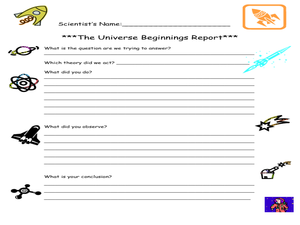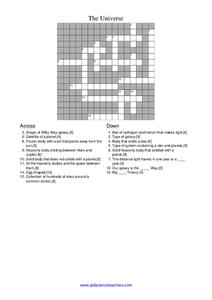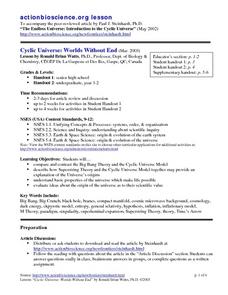Curated OER
Space: The Universe As We Know It!
Students simulate the Big Bang. In this lesson on the origin of our universe, students role play to show how the Big Bang explosion may have created our universe.
Curated OER
Exploring Big Bang Evidence
Ninth graders study the Big Bang theory. For this big bang theory lesson students research the Internet and complete several activities and create a presentation.
NASA
Cosmic Microwave Background
Begin your next class with a BANG! Pupils discuss the formation of our universe and its expansion before proceeding with an activity designed to demonstrate what most likely occurred billions of years ago. They conclude with a discussion...
Curated OER
Who Ever Heard of the Big Bang?
Students examine the theories that attempt to explain the origins of the Universe. Some theories are based on scientific facts. Others find their source in folklore. The variety of beliefs systems are discussed as a motivating factor for...
Curated OER
What a Cosmic Web We Weave
Students explore, using journals and discussion in small groups, how the universe has evolved since the theoretical Big Bang and create dramatizations of various eras in cosmic evolution.
Space Awareness
History of the Universe
Your pupils may believe that you and their parents are the oldest things in the universe, but surprise! There are elements of the universe that are even older. Elementary scientists create a class timeline to demonstrate the...
Curated OER
The Big Bang-Hubble's Law
In this Hubble's law activity, students use data for galaxies which include their distance and speed. Students make a graph to show the distance to each galaxy and the speed of each galaxy. They use their graph to answer 4 questions...
Curated OER
The Universe
In this space science worksheet, learners use the clues given at the bottom of the sheet to complete the crossword puzzle relating to the universe. There are 16 clues to solve in the puzzle.
Curated OER
History of the Universe
Students describe how the universe was formed. In this astronomy lesson, students listen and respond to questions in a PowerPoint lesson that includes various theories about how the universe was created.
Curated OER
Cyclic Universe: Worlds Without End
Students compare and contrast the Big Bang Theory and the Cyclic Universe Model. They explain basic properties of the univers which make life possible. They evaluate ideas about the origin of the universe as to their scientific value.
Curated OER
Scavenger Hunt: Who am I?
In this space science learning exercise, students use the sites listed on the Solar System and Planets page of the Kid Zone to locate the names of the people credited with each discovery. They identify and name 26 different scientists...
Curated OER
New Gun Control Politics: A Whimper, Not a Bang
Using an article from The New York Times, students answer discussion questions about gun control. They are divided into four groups to research different standpoints on gun control, including the Executive Office, Congress, Gun...
It's About Time
The Doppler Effect
In 1842, Christian Doppler proposed a theory relating the change of wavelengths based on motion. Young scholars observe the Doppler Effect on a small scale in a ball, on a larger scale from a car, and on the largest scale studying the...
Curated OER
Astronomy
In this astronomy worksheet, students find fifty one words in a word search that are related to comets, galaxies, planets, moons, stars and the tides.
NASA
Raisin Bread Universe
What is the universal breakfast? The resource includes two activities, the first one observing oatmeal to understand the texture of the universe. Then, scholars measure raisin bread dough before and after it rises to represent the...
Core Knowledge Foundation
Astronomy—Our Solar System and Beyond Tell It Again!™ Read-Aloud Anthology
A read-aloud anthology explores our solar system and beyond. Informational texts about astronomy invite pupils to discuss readings. Extension activities examine vocabulary, sayings, and phrases. Scholars work through the writing process...
Curated OER
Scavenger Hunt: Who am I?
In this solar system worksheet, students use an on line source to find the names of the people who discovered the planets, comets, asteroids, black holes and the idea of the big bang theory.
American Museum of Natural History
What Do You Know About Astronomy
Develop an understanding of the universe. Learners answer 10 multiple choice questions about several topics in astronomy. Questions contain information about the age of the universe, gravitational attraction, galaxies, planets and comets...
media.yurisnight.net
Science Lesson Plan: Our Solar System: I Wonder?
Ever wonder why Pluto isn't considered a planet? Or how large the Earth is compared to the other inner planets? Explore the universe with a series of projects that simulate different aspects of our solar system. The activities require...
NASA
Measuring Dark Energy
You're only 10 minutes late? Do you know how much the universe has expanded in those 10 minutes? Scholars graph supernovae based on their redshift and see if the results verify Hubble's Law. If it does confirm it, the universe is...
NASA
Cosmic Times 2019
NASA is planning a journey to Mars, and current scholars could very well be a part of a future mission. During the unit, pupils research the advances in space exploration and knowledge about the universe. Then they work in groups to...
McGraw Hill
Cosmology
Explore the birth and possible death of the universe. An interactive simulation allows learners to manipulate the Hubble Constant to model the expansion of the universe from birth. Varying the constant provides different scenarios for...
Princeton University
A Teacher's Guide to the Universe
Astronomers only observe four percent of the universe as the rest hides in darkness. The size, shape, and movement of the universe are the focus for an long-term high school unit. Its 43 lessons include hands-on experiments, direct...
Howard Hughes Medical Institute
Distribution of Elements in Earth’s Crust
How do scientists know the difference between a meteorite from space and a regular rock from the earth? Scholars read a passage and answer comprehension questions about the creation of the solar system. They extrapolate the main ideas to...
Other popular searches
- The Big Bang Theory
- Space Big Bang Theory
- Scientific Big Bang Theory
- Science Big Bang Theory
- Space: Big Bang Theory
- Big Bang Theory Experiments
- Geography Big Bang Theory
- Space\: Big Bang Theory
- Space\\: Big Bang Theory

























